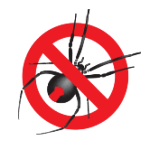
PEST CONTROL FOR HOSPITALS
Australian Standard AS 3660.2-2017 ‘Termite management’ outlines the requirements for pest management in buildings, including hospitals. This standard establishes guidelines and methods for the prevention of pest infestations and their management. Hospitals are expected to comply with these standards to maintain a clean and hygienic environment that meets public health expectations.
Hospitals on the Northside of Brisbane face unique challenges when it comes to pest control. With the warm and humid climate, pests such as ants, cockroaches, rodents, and mosquitoes can quickly infest a healthcare facility. These pests can transmit diseases, compromise the sterility of medical equipment and facilities, and put the well-being of patients and staff at risk. Effective pest control measures are crucial for maintaining a healthy environment that supports patient recovery and comfort.
The importance of pest control for hospitals
Hospitals are critical institutions, providing essential healthcare services to the communities they serve. Maintaining a high standard of hygiene and cleanliness in a hospital is crucial to ensure the safety and comfort of patients, staff, and visitors. One vital aspect of maintaining a sanitary environment in hospitals is effective pest control. Here are the benefits of pest control for hospitals on the Northside of Brisbane.
Reducing the Risk of Pest-Borne Diseases Affecting Patients, Staff, and Visitors
The presence of pests in healthcare facilities can lead to the transmission of various diseases. Pests such as rats, mice, cockroaches, and mosquitoes can carry bacteria, viruses, and parasites that can pose serious health risks to individuals within the hospital. Implementing a comprehensive pest control program helps to reduce the chances of pests entering the facility or breeding within the hospital’s vicinity. This significantly lowers the risk of patients, staff, and visitors being exposed to pest-borne diseases, ensuring the safety and well-being of all those within the hospital’s premises.
By implementing regular pest control measures in government facilities in Brisbane’s Northside, it’s possible to limit the population of these disease-carrying pests and effectively reduce the risks associated with their presence.
Maintaining the Sterility of Equipment and Facilities
Hospitals house various equipment and medical devices that must be kept sterile to prevent infections and complications during treatment. Insects and rodents can contaminate these essential tools, thereby undermining the safety and effectiveness of medical procedures. A reliable pest control program helps to protect valuable and sensitive equipment from contamination, ensuring they remain safe and ready for use when required.
Contributing to a More Pleasant and Comfortable Environment for Patients
A pest-free hospital creates a more pleasant and comfortable atmosphere for patients. By eliminating the presence of pests, hospitals can provide a cleaner, more inviting environment that promotes healing and recovery. Patients are already dealing with stress and discomfort related to their medical conditions. Ensuring they are not further distressed by encountering pests during their stay contributes significantly to their overall care and satisfaction.
Protecting the Hospital's Reputation and Public Image
The presence of pests in a hospital is not just a health risk, but it can also damage the institution’s reputation and public image. News of pest infestations in healthcare facilities can quickly spread through the community, causing concern and mistrust among potential patients and their families. Investing in professional pest control services demonstrates a hospital’s commitment to maintaining high standards of cleanliness and care, thereby safeguarding its hard-earned reputation.
Minimising the Costs Associated with Pest Damage and Health Risks
Effective pest control in hospitals can save significant costs in the long run. Pests are capable of causing physical damage to structures and equipment, leading to expensive repair or replacement costs. Furthermore, pest-related health risks can result in costly legal liabilities, additional treatment expenses, and a loss of revenue due to decreased patient trust. By proactively addressing pest issues through a comprehensive pest control strategy, hospitals can prevent such costs and maintain their financial stability.
What is the process of pest control for hospitals?
The pest control process for hospitals typically involves the following steps:

1. Initial assessment
A thorough inspection of the hospital premises to identify potential problem areas, entry points, and existing pest infestations.

2. Customised treatment plan
Development of a tailored pest control plan to address the specific needs of the hospital and the types of pests present.

3. Pest treatment
Implementation of the pest control plan, which may involve chemical treatments, baits, traps, or other measures, based on the pests identified and the unique needs of the facility.

4. Regular monitoring
Ongoing inspections and monitoring to ensure the effectiveness of treatments and to identify any new pest activity.

5. Reporting and documentation
Documenting the pest control process and providing regular reports to the hospital management to demonstrate compliance with relevant standards.
What types of pests can be controlled?
Pests pose a major health risk in healthcare facilities. They can contaminate sterile environments, spread diseases, and even cause damage to the building infrastructure. Pest control services aim to prevent and minimise the risk of harmful pests infiltrating hospitals and other healthcare establishments. By targeting and eliminating potential infestations, pest control services are essential in maintaining cleanliness, safety and overall patient satisfaction in healthcare environments on the Northside of Brisbane.
Hospital environments must be vigilant against a range of invasive pests. These pests can include:

Ants
Ants are known for their ability to contaminate food and transmit disease-causing pathogens. Certain types of ants, such as fire ants, can even cause severe allergic reactions. Effective ant control helps prevent these problems, safeguarding the health of patients and staff.

Termites
Termites are notorious for their potential to cause structural damage to buildings. Hospitals are no exception, and unchecked termite infestations can have catastrophic consequences. Specialised termite treatment services can identify and eliminate any possible termite colonies to protect the building and maintain a safe environment.

Cockroaches
These hardy pests can survive in a variety of conditions, making them a persistent problem across the Northside of Brisbane. Cockroaches spread various diseases and can contaminate medical equipment and facilities. Regular cockroach control services are essential to keep these pests at bay.

Rodents (rats and mice)
Rodents are known carriers of numerous diseases and can cause destruction to hospital infrastructure, increasing the risk to patients and staff. Rodent control services ensure that any rat or mouse infestations are quickly located and eradicated, minimising the risk of infection and damage.

Mosquitoes
Mosquitoes are notorious carriers of diseases like dengue fever, Zika virus, and Ross River virus. For hospitals, prevention of these diseases starts with effective mosquito control. Ongoing pest control efforts, such as surveillance and targeted treatments, help to reduce the mosquito populations in and around healthcare facilities, mitigating potential outbreaks.

Bed bugs
Bed bug infestations can result in widespread discomfort and allergic reactions amongst patients and staff. To prevent the spread of these pests, regular monitoring and bed bug extermination services (that comply with the bed bug code of practice) are essential in healthcare facilities.
What is the cost of pest control for hospitals
The cost of pest control for hospitals will depend on several factors, such as the size of the facility, the severity of the infestation, and the specific types of pests involved. It is essential to work with a reputable pest control specialist, such as Little Critters Pest Control & Termite Management Specialists, to receive a comprehensive and accurate quote tailored to your hospital’s unique needs.
Protect your hospital from pests with Little Critters Pest Control
Maintaining a clean and hygienic environment is of utmost importance in healthcare facilities, especially hospitals. A critical aspect of maintaining a safe environment for patients, staff, and visitors alike is ensuring effective pest control measures are in place. Little Critters Pest Control & Termite Management Specialists Brisbane are experts in providing comprehensive pest control services specifically tailored to suit the unique requirements of hospitals.
Experience
Having extensive experience in managing pests in healthcare settings, we understand the unique challenges that hospitals face in terms of pest control. Our technicians have endorsement for managing “Sensitive and Complex Sites” as per the new requirement of the Medicines and Poisons Act 2019. Our team of professionals are not only knowledgeable but also skilled in employing the safest and most effective treatments to ensure a pest-free environment in your hospital, minimising risks to patients and staff.
Quality Assurance
At Little Critters Pest Control & Termite Management Specialists, we take quality assurance seriously. We are committed to complying with the Australian Standard AS 3660.2-2017, to provide every healthcare facility with the peace of mind that they are receiving the highest quality pest control services, tailored to their needs. Our adherence to these standards ensures the best results for your hospital.
Customised Approach
We understand that each healthcare facility is unique and has specific requirements, considering factors such as the surrounding environment or the type of pests present. When you choose Little Critters Pest Control & Termite Management Specialists for your hospital’s pest control needs, you can expect a customised approach, taking into account your specific needs, and addressing them effectively. This includes understanding the hospital layout, implementing targeted treatments, and advising on preventative measures to decrease the likelihood of future infestations.
Comprehensive Support
Our support goes beyond just an initial assessment or treatment. We provide ongoing support for your hospital, from assessing the facility’s current pest situation to ensuring regular monitoring and helping to maintain a pest-free environment. Our holistic approach to pest control ensures that any potential infestations are identified and addressed promptly, preventing them from escalating into more significant problems.
FAQ about pest control for hospitals
What are the most common pest control issues faced by hospitals in the Northside of Brisbane?
Hospitals in the Northside of Brisbane commonly deal with a variety of pests, including rodents, cockroaches, ants, termites, and bed bugs. These pests can potentially spread diseases and contaminate hospital environments, making it essential to have effective pest control measures in place.
How can pests negatively impact the hospital environment and patient care?
Pests in hospitals can potentially spread diseases, contaminate medical supplies and equipment, and cause distress to patients and staff. A pest-infested hospital environment can also lead to increased healthcare costs, compromised patient care, and harm to the hospital’s reputation.
How can hospitals ensure the safety of patients and staff when implementing pest control measures?
Hospitals can ensure patient and staff safety by choosing non-toxic pest control methods, closely following manufacturer instructions for any pest control products, and working with a professional pest control company that caters to healthcare environments. Hospitals should also keep patients and staff informed about any pest control measures being taken.
What are some key pest control measures for hospitals in the Northside of Brisbane?
Effective pest control measures for hospitals include regular inspections, integrating pest management into facility maintenance plans, educating staff on pest prevention, using non-toxic pest control methods, and working with a professional pest control company to address infestations promptly.
When should a hospital in the Northside of Brisbane seek professional help for pest control?
Hospitals should seek professional pest control assistance if pests are frequently seen in the facility, if there are signs of structural damage due to pests, or if infestations are recurring despite in-house efforts. A professional pest control company can help identify the cause of infestations and develop a tailored pest control plan for the hospital.
Contact Little Critters Pest Control & Termite Management Specialists today
If your hospital requires professional pest control services on Brisbane’s Northside, contact Little Critters Pest Control & Termite Management Specialists today for a free quote. Our experienced team will work with you to maintain a clean, safe, and hygienic environment for your patients, staff, and visitors.
